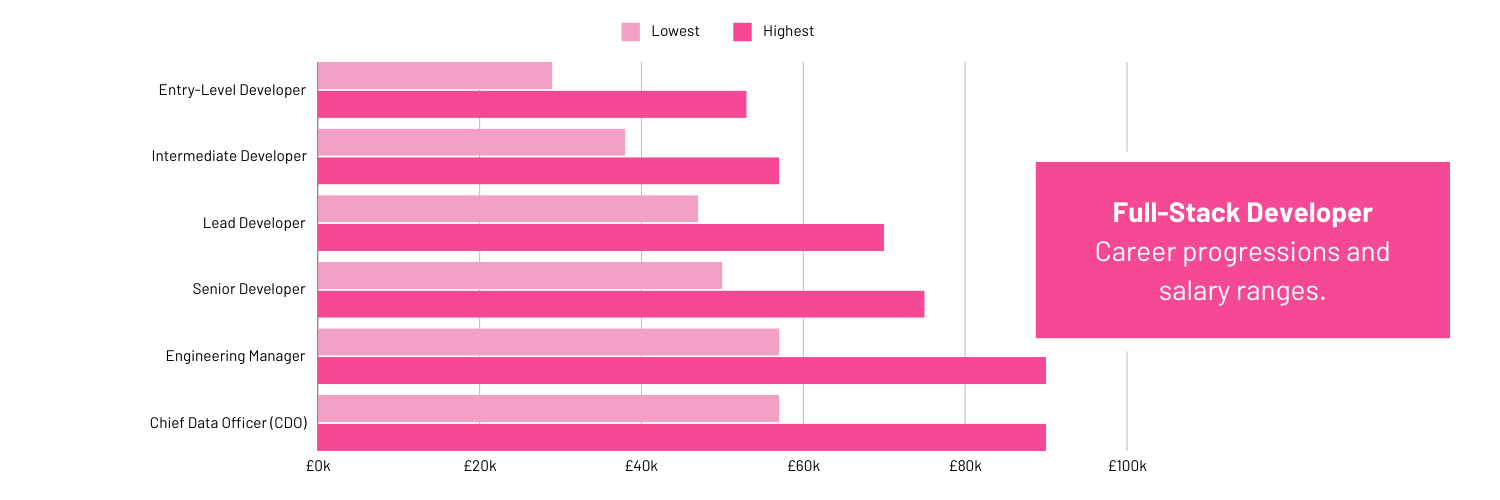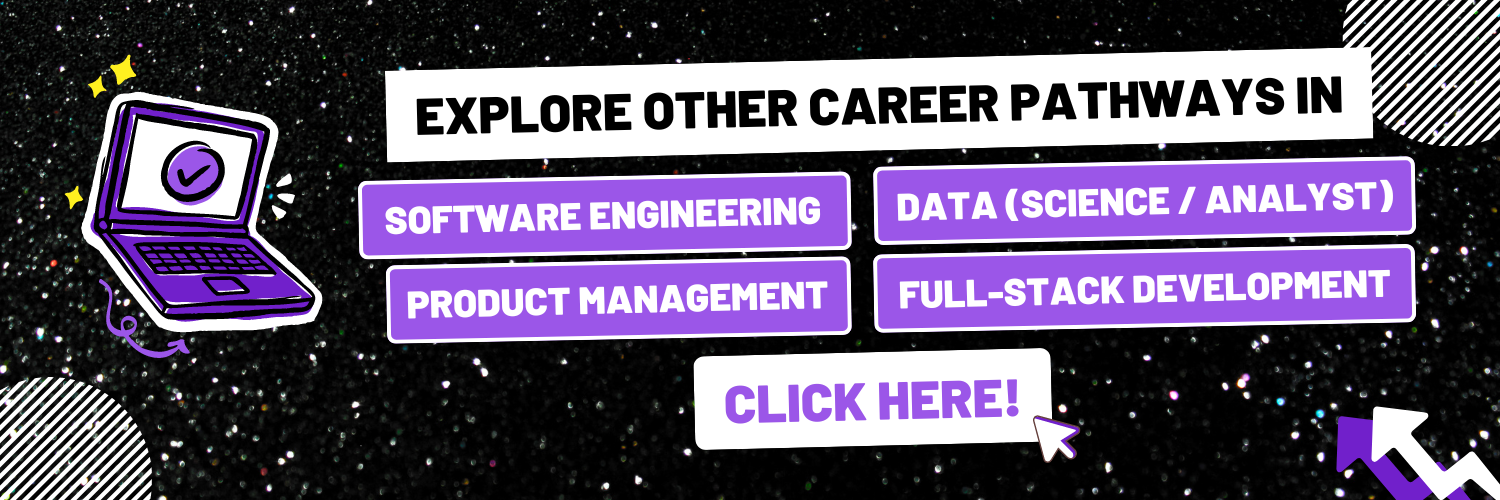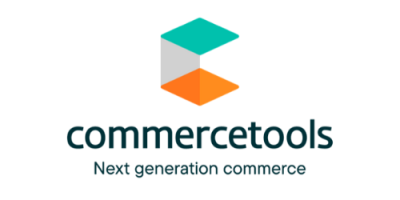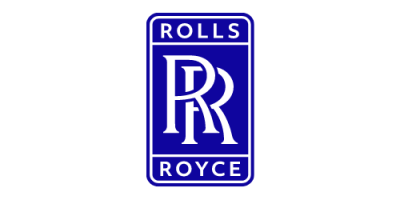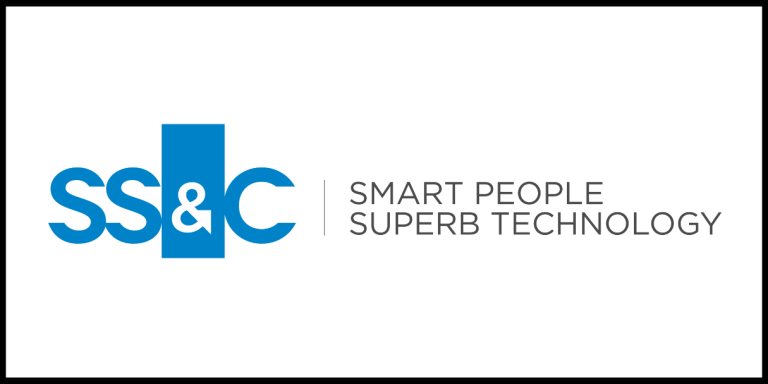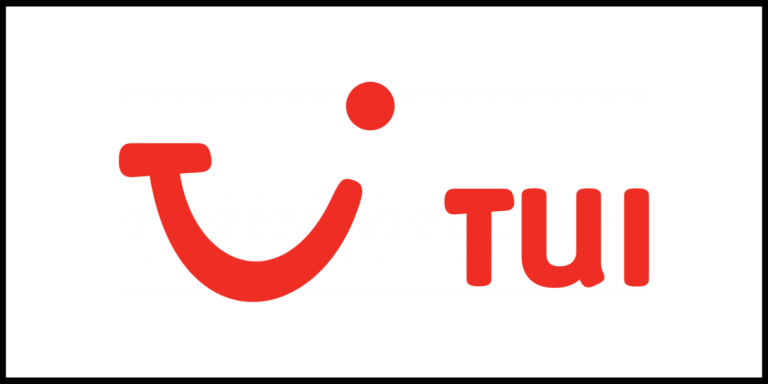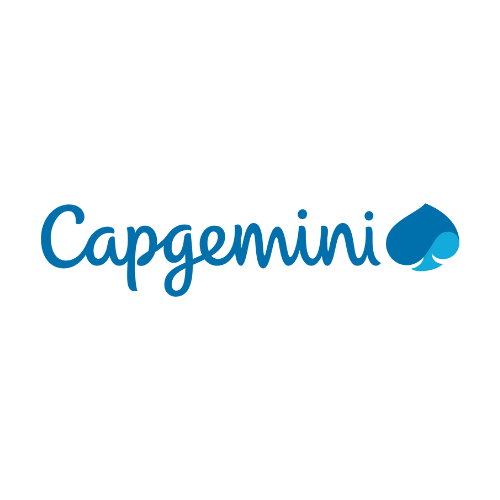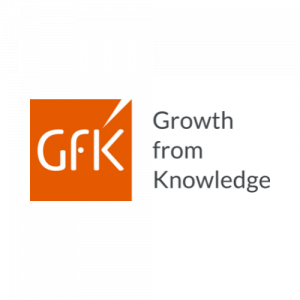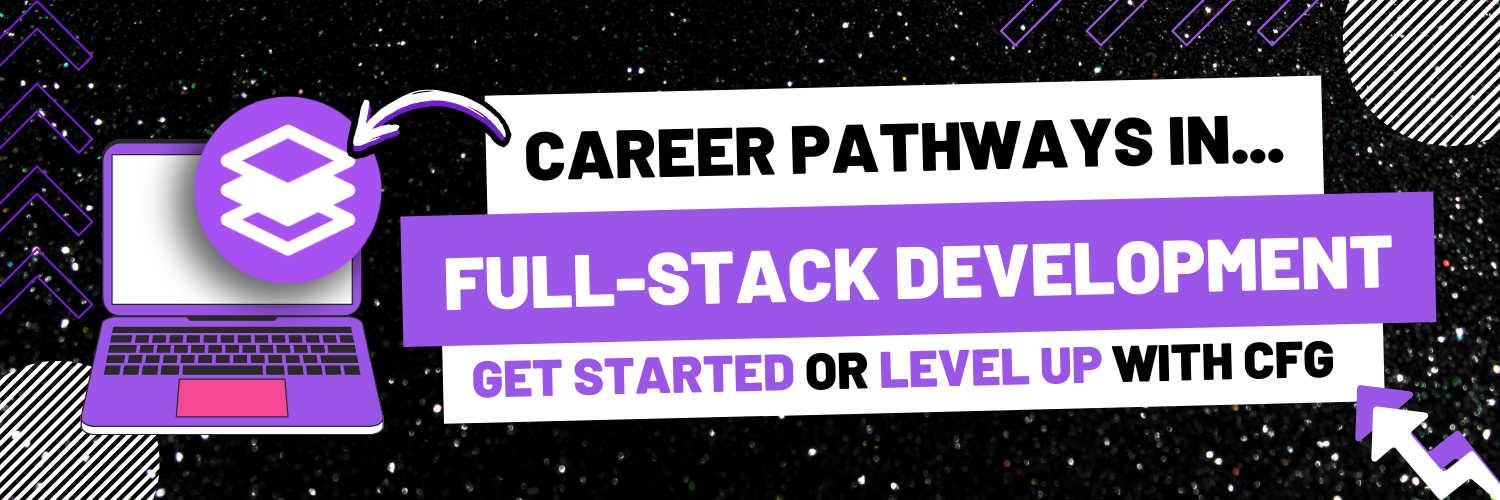
Content Menu
How to start and progress a career in Full-Stack Development
STARTING A CAREER IN FULL-STACK DEVELOPMENT
A career in full-stack development can be a really exciting and gratifying career path, providing many opportunities to upskill and find your niche within the different areas of tech. Full-stack development plays a key role within software development that requires professionals who will be able to work both on the front-end and back-end development of a website, application or software – which we will look into more depth below. If you are interested in getting started or shifting your career into this field, then here is our top guide for becoming a full-stack developer.
A full-stack developer (FSD) is a versatile team member, proficient in both front-end and back-end development and capable of working on all aspects of a web application or software. They are responsible for writing, testing, and maintaining high-quality code, collaborating with a team, and addressing various stages of the software development life cycle.
Full-stack developers handle tasks ranging from
- Designing user interfaces
- To develop server-side logic
- Managing databases
Essentially they are contributors to creating innovative and functional technology solutions.
WHAT ARE THE CORE SKILLS OF A FULL-STACK DEVELOPER?
Full-stack developers are expected to become proficient in front-end technologies, including JavaScript, HTML, and CSS. As well as back-end languages and frameworks such as Python, Node.js, etc.
Full-stack developers must be highly capable of working with databases and server-side architecture and have a strong understanding of version control systems and deployment processes.
WHAT TECHNOLOGIES ARE USED IN FULL-STACK DEVELOPMENT?
Full-stack developers will encounter an array of coding languages during their careers such as those mentioned below
- ✅ Python
- ✅ JavaScript
- ✅ React
- ✅ Angular
- ✅ Vue.js
- ✅ front-end.
- ✅ Node.js
- ✅ Express
- ✅ Django
- ✅ MySQL
- ✅ PostgreSQL
- ✅ MongoDB
How many are you familiar with right now?
Get started with your learning checklist today by checking out the Tech Taster we currently have available to study live and on demand. They are great for beginners and are the perfect start to your coding journey!
FULL-STACK DEVELOPMENT JOB ROLES AND RESPONSIBILITIES
Front-End Developer 👉
A front-end developer focuses on a website or an application’s user interface and user experience – which includes layouts, navigation and interactive elements. They are responsible for designing and implementing visual features of the application that are usually client and user-facing. So developing an eye for detail and design is a helpful trait to have in this role.
SKILLS CHECKLIST FOR FRONT-END DEVELOPMENT
Are you proficient in
- HTML
- CSS
- And JavaScript?
Are you familiar with front-end frameworks/libraries like
- React
- Angular
- And Vue.js?
Do you have a developed understanding of responsive design principles?
- Are you able to collaborate with UI/UX designers to implement design specifications?
Back-End Developer 👈
A back-end developer, on the other hand, focuses more on the server side of an application which includes managing databases, server logic, and ensuring the smooth functioning of the applications.
They are responsible for ensuring security and performance on the server side, integrating databases to store and retrieve data. As well as developing server-side logic and APIs (applications programming interfaces) that handle data processing, user authentication and other server-related tasks.
SKILLS CHECKLIST FOR FRONT-END DEVELOPMENT
- Are you experienced in a back-end programming language, such as
- Java
- Python,
- PHP, etc.?
- Are you familiar with back-end frameworks such as
- Express.js
- Django
- Flask
- Ruby on Rails, etc?
- Do you have expertise in databases and data modelling?
- Experience with server deployment and optimisation?
Full-stack development 👉👈
Full-stack brings the best of both worlds in development together! Full-stack developers have expertise across both front-end and back-end development, meaning they often have to be pretty well-versed and agile in both areas. In a team scenario, different individuals within these three roles often collaborate closely to build fully functional web applications.
The career path of a developer in tech can follow a trajectory that includes various levels of expertise, responsibilities, and potential specialisations (we’ll touch on that shortly!). To have a long and fulfilling career, we always encourage you to take on new learning opportunities and challenges at various stages in your journey.
WHAT IS THE CAREER PROGRESSION OF A DEVELOPER FROM ENTRY-LEVEL DEVELOPER, TO FULL-STACK AND BEYOND?
ROLE PROGRESSION FOR A DEVELOPER
- Entry-Level Developer
- Intermediate Developer / Software Engineer
- Senior Developer / Senior Software Engineer
- Lead Developer / Tech Lead
- Engineering Manager / Development Manager
- CTO (Chief Technology Officer) or VP of Engineering
Entry-Level Developer
These are often referred to as ‘Junior Developers’ or may even start as Software Engineers by gaining hands-on experience and exposure to the development environment. They get involved in code implementation and apply these to smaller tasks and best practices. At this stage, proficiency in foundational programming languages and frameworks would be an essential skill to have as you get started.
Next Steps to level up ☝️Focus on improving coding skills and problem-solving abilities such as through hackathons or mini-coding projects. We recommend trying out or Tech Tasters which will allow you to collect knowledge on different tech topics as an entry-level developer, to test out the waters and discover strengths and weaknesses.
Intermediate Developer
As developers gain experience, (or for some more seasoned software engineers) they will move into more intermediate roles, where they take on more complex tasks and contribute to larger projects. This involves being more hands-on with a larger portion of projects, mentoring junior developers, and collaborating with other team members around architecture and design decisions.
Next Steps to level up ☝️This would be a great time to start considering what areas you would like to specialise in, whether you want to stick with either front-end or back-end. Perhaps you’d be interested in mobile development? Or maybe you like being an all-rounder and continue levelling up in full-stack! At this stage, learning is key and pursuing advanced training and certifications like with our Kickstarter Classes and even the CFGdegree, can really boost your prospects in higher-level roles.
Senior Developer
Senior Developers will take on more leadership roles within development teams, so a lot of the day-to-day tasks may involve collaborative projects. They’ll also be contributing to strategic decision-making and leading project development. With their in-depth knowledge of technology stacks, comes opportunities to take on mentorship with both junior developers and engineers within the teams.
Next steps to level up ☝️At this point in your career, there are opportunities to specialise in more niche and emerging technologies such as machine learning and artificial intelligence, as well as pursue further leadership learning or management positions. If you want to hone your skills and pursue the next levelling stage, we recommend signing up for our mid-level accelerator course that will provide you with the skills and tools to do just that.
Lead Developer / Tech Lead
Tech Leads are responsible for overseeing the technical aspects of a project or team. They guide technical decisions and ensure the team follows best practices. This often involves coordinating with other teams and stakeholders and using their expertise to resolve technical challenges. At this stage in a developer’s career, they are expected to have pretty advanced leadership and communication skills, in addition to problem-solving and project management.
Next steps to level up ☝️The next step would be to consider moving onto more managerial roles such as a development manager or engineering manager – depending on your expertise and specialisations. Some companies will also offer opportunities to pursue executive-level technology leadership training.
Engineering Manager / Development Manager
This role will typically involve overseeing the entirety of development teams, so good project and team management will be core skills to acquire before stepping into this part of your career. A large portion of responsibilities will include ensuring projects are delivered on time, and teams are effectively collaborating – working towards aligned business goals.
Next steps to level up ☝️Having developed strong leadership and management skills will be essential at this stage of a Developer’s career, but harnessing strategic thinking to execute business decisions, as well as just technical aspects will be highly desired to reach executive levels such as Director of Engineering and Chief Technology Officer.
CTO (Chief Technology Officer) or VP of Engineering
The role of the Chief Technology Officer and even the VP of Engineering will be different for each company and even industry. However, in general, these top leadership positions are responsible for the overall technology strategy and direction of the company. They are responsible for setting the technology vision and strategy, whilst making sure that it aligns with business objectives and how it may impact the organisation overall. Being able to stay updated with the latest technology and industry trends is highly valued to continuously drive innovation
Next steps?! You might think the learning stops here but in fact, there’s always something new to learn and a skill to get better at! Continuous learning is at the heart of tech because the environment changes quite quickly, so an openness to expanding your skills at every stage can fulfil both your personal and professional development.
Full-stack Developer progression and salaries
- Entry-Level Developer: £29k to £53k / yr
- Intermediate Developer / Software Engineer: £38k – £57k / yr
- Lead Developer / Tech Lead: £47k – £70k / yr
- Senior Developer / Senior Software Engineer: £50k – £75k / yr
- Development Manager: £57k – £90k / yr
- CTO (Chief Technology Officer) or VP of Engineering: £60k – £132k / yr
These salaries will change yearly by industry and by experience, so openness to continuous learning and development can help you grow as a developer throughout your career.
HOW TO BECOME A FULL-STACK DEVELOPER WITH CODE FIRST GIRLS
This career path provides a general roadmap, but it’s important to note that individuals may take different routes based on their interests, industry demands, and evolving technology trends. Continuous learning, gaining practical experience, and staying updated with emerging technologies are crucial for a successful career in tech development.
We offer a wide range of ‘Intro To…’ courses to get you started in your pathway towards becoming full-stack. Whether you’re new to learning or looking for a refresh, this self-paced, 4-lesson course is a great place to start learning the ins and outs of code.
Mastering full-stack development is a crucial skill many employers seek, especially in tech where innovation happens daily! Our classes will take you through front-end and back-end development, server management, API integration, and more!
After building your foundational skills with our Tech Tasters and classes, you can expand your expertise with our Full-Stack Development CFGdegree course. This program will prepare you for a career as a Full-Stack Developer, capable of handling front-end, back-end, and server management, and much more!
Our +Masters for Full-Stack Development will focus on advancing your skills in DevOps and Cloud, preparing you for roles such as DevOps Engineer and Cloud Architect. You’ll gain core competencies in continuous integration, deployment, cloud infrastructure management, project maintenance, and more, ensuring you are well-equipped to handle the demands of modern tech environments.
For those with 2+ Years of experience, our Mid-Level Accelerator course is designed to help you level up and unlock your developer velocity.
CONCLUSION
Being a full-stack developer can be a great pathway if you feel like a jack of all trades and enjoy implementing your skills on various tech projects and challenges. There’s no better time than now to harness all the resources CFG can provide to get you on your way to a career in tech. For information about the CFGdegree, click the link below.
THE FULL-STACK PATHWAY FROM ROBYN'S EXPERIENCE
We interviewed our colleague Robyn McClelland who graduated from the CFGdegree in 2024! This is what she said
“The coolest thing about the CFGdegree program has got to be how it mixes learning along with the instructor and then working on real work-life challenges. It’s not your typical degree where you just sit in lectures all day, you dive into hands-on projects from the start!
Whether we’re building databases, building apps on React, or cracking the code to integrate new applications using API, every day brings something new and exciting. The best part? Learning from pros who’ve been there, done that, and are still trailblazing in their fields.
The best part of graduation is the build-up. The excitement of the big day, where we’ll celebrate all the late nights, the breakthroughs, and the friendships made along the way.
Stepping onto that stage, surrounded by cheers and decked out in cap and gown, it’s a moment to remember. It’s not just about closing the books on this chapter; it’s about the journey for whatever comes next, armed with the skills and experiences that CFGdegree has given me.”
Watch the video to the right to learn more about Robyn’s CFGdegree Q&A!
INDUSTRIES FOR DATA ANALYTICS
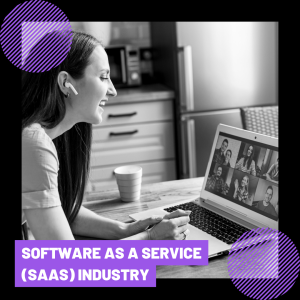
SAaS Software
In the Software as a Service (SaaS) a full-stack developer is usually responsible for developing and also maintaining both the client and service side of a web-based application (i.e. Canva). Therefore, they are in charge of building intuitive and responsive user interfaces that allow users to interact with the software. Whilst also managing the server infrastructure. They will also normally collaborate with product managers, designers and other developers to scale the product and deliver high-quality, user-centric software solutions that meet the needs of the SaaS company or clients,

E-Commerce Industry
Within the e-commerce industry, a Full-stack developer’s responsibility may involve creating and maintaining the entire software infrastructure that powers online stores that customers browse and buy from (i.e. Amazon.com). They also develop user-friendly interfaces ensuring smooth navigation allowing customers to have a pleasant buying journey all the way to completing transactions. They’ll also manage back-end servers which include databases, application logic, and secure transactions. As e-commerce technology grows, they must be able to implement new tools to ensure a user-centric shopping experience can be done.

